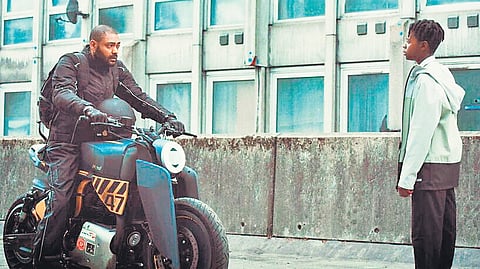

The soul of actor Daniel Kaluuya’s directorial debut, The Kitchen, speaks of love in a time of great disparity. The narrative elegantly brings in affection into a dystopian world; as for the melancholy, you can see it in the sad eyes, the deep pauses during conversation, and the subtle social commentary. You might seek an overt act of love—a kiss, a hug, or a pat on the back—but this isn’t such a film. And yet, it evokes strong emotions.
From the first moment, the film holds you in its grip. The Kitchen is titled after a residential colony by the same name in a world where people live in cell-like structures patrolled by drones. The inhabitants belong to the lowest social strata. The unique apartment buildings and glitzy neon lights create an ambience resembling a third-world East Asian neighbourhood.
The colony has a community radio service through which plays the role of a narrator-of-sorts. This device ensures that the main characters are not burdened with the task of world-building or explaining the intricacies of the universe. Instead, they simply respond to their environment and drive the plot forward without being bogged down by the pressure of exposition.
The heart of The Kitchen is Izi (a brilliant Kane Robinson). He is a loner, his eyes brimming with melancholy. They rarely shine and long for some meaning. Izi works at a funeral home that creates a memorial plant after cremation. Just when he seems particularly lost, he finds Benji (a wonderful Jedaiah Bannerman), and suddenly, there’s a beautiful bond between one broken man and another.
The main leads are not tasked with having to be liberators, even though the residents are ill-treated by the state. There’s plenty of social commentary, but the film sells emotions without resorting to the obvious and without diluting its premise. The story flows organically, and this is perhaps the film’s biggest strength.
In one of the final scenes, Benji asks Izi whether the latter is his father, even as they look down the street at residents crowding the police officials. As the camera pans back, showing the two of them from behind, and as Izi places his hands on Benji’s shoulders, you recognise the urge for them to embrace and shed tears. And yet, sometimes, affection means a lot more than a simple physical gesture. The film may be set in a dystopian world, but when there exists such affection, you realise utopia isn’t unattainable.
The Kitchen
Director: Kibwe Tavares, Daniel Kaluuya
Genre: Sci-fi
Platform: Netflix
Language: English
Rating: 3/5